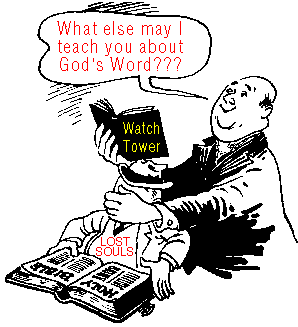Thought I'd start a thread discussing all the scriptures where the Watchtower translation committee has taken liberties and abused verses they've translated in the NWT.
Worst of all are the numerous places in the Christian Greek Scriptures where 'Jehovah' has been inserted where the tetragrammaton or any equivalent of it does not occur in any extant MSS and where the context could just as easily mean, or even more likely mean, the identity being spoken of is Jesus Christ rather than the Father. Although in many places out of the 237 in the NT where they have done this the identity is clearly or most probably the Father (Jehovah) as distinct from the Son (Jesus), there are dozens of occurrences where this is not the case.
Here are a whole lot more scriptures abused by the translators of the NWT, copied from the Freeminds website (article written J Bowman, scholar):
ADDING WORDS
In Colossians 1:16-20 the word "other" is added four times in the NWT to make it appear that Christ is part of creation. Paul is thus made to say that "all [other] things" were created in and for Christ, as if Christ were one of the created things. It is, of course, legitimate for translators to add the word "other" where this does not change the meaning but simply makes for smoother English (e.g., Luke 11:41-42; 13:2,4). In Colossians 1:16-20, however, adding "other" substantially changes the meaning.
What is not so often recognized is that the NWT does this same thing in several other passages as well (Acts 10:36; Romans 8:32; Phil. 2:9). In Romans 8:32 ("....will he not also with him [Jesus] kindly give us all other things?"), the word "other" is not even placed in brackets, contrary to the work's stated practice.[5] In each case, the intent is apparently to undermine the implication of the text that Jesus Christ is God.
There are several other texts where the NWT adds words without brackets which change the texts' meaning. Some of these have real doctrinal significance. In Romans 8:28 "all things" is changed to "all his works." This implies that God does not work "all things" together for good to those who love God, but only those things which He Himself does, over which He therefore has control. This allows for their belief that God does not have control over all things.
In Philippians 1:23-24 (NWT) several words are added without brackets that, along with some other changes, completely alter the structure and thereby the meaning of the text. The passage reads in the NWT (with the added words italicized), "I am under pressure from these two things; but what I do desire is the releasing and the being with Christ, for this, to be sure, is far better." There are other errors as well, but the additions indicated here clearly change the meaning. JWs translate it this way in order to avoid the text's implication that at death Paul would be with Christ. Such an implication would contradict their belief that death involves the annihilation of the soul.
Some of the additions in brackets with the NWT so clearly change the meaning that it is a wonder that more JWs do not question them. In 1 Corinthians 14:12-16 the expression "gift of the" is added in brackets five times, changing "spirit" to "[gift of the] spirit." The result is that Paul's contrast between his own personal "spirit" and his "mind" is removed, which again serves the JW doctrine that the spirit is not a distinct entity which survives death. To assure that this contrast is missed, the word "my" is also added in brackets before "mind" twice in verse 15. Thus the simple contrast between "the spirit" and "the mind" is changed to "the [gift of the] spirit" and "[my] mind."
OMITTING WORDS
The NWT also omits key words on occasion, when retaining them in the text would seem to contradict JW doctrine. The most glaring example is Romans 8:1, "Therefore those in union with Christ Jesus have no condemnation," which omits the word "now." This omission is evidently motivated by the fact that JWs do not believe anyone can claim to be free of condemnation now.
Also notable is the NWT rendering of Colossians 1:19, "because [God] saw good for all fullness to dwell in him." Here the little word "the" is omitted before "fullness." This is significant, because in the NWT rendering "all fullness" is ambiguous, whereas "all the fullness" clearly refers to the "fullness" of God's own being (cf. Col. 2:9).
John 14:14 should also be mentioned. In the NWT this reads, "If YOU ask anything in my name, I will do it." The Greek text in the KIT, however, has "me" after "ask." It therefore should be translated, "If you ask me anything in my name, I will do it." It is true that some later Greek manuscripts omitted this word, but most of the earlier ones included it, and most modern editions of the Greek New Testament (including those used by the JWs in producing the NWT) include it. At the very least, the NWT ought to have mentioned this reading in a note.
